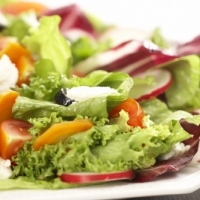Depression and Weight Gain
When we get depressed, we often turn to something comforting to temporarily make the depression go away. We want to be happy, but rather than dealing with the cause of the depression, we want a magic cure鈥攕omething that makes us feel good right away. For some, this is becoming engrossed in a hobby or in their job until they shut out the rest of the world. For others, it鈥檚 food.
Comfort eating is the term most commonly used to refer to people eating as a way of feeling good. To some extent, we all do this. Who hasn鈥檛 stopped off for some ice cream or had a candy bar after a bad day at work? These little pick me ups generally aren鈥檛 a sign of depression, and most of the time, they鈥檙e harmless. They鈥檙e just little treats that we use to make ourselves feel a little better after a bad day. However, when it goes from an every now and then treat to an every day necessity, it has crossed the line.
It can be hard to see the signs of comfort eating right away. In fact, to some extent we even encourage comfort eating in those who are suddenly depressed, which is a danger. After someone has died, friends and family often bring over food for the gathering after the funeral. Usually, this is food that makes people feel good, and it鈥檚 this food that starts the eating. Other times, people will take a depressed friend out to dinner at our favorite restaurant as a way of trying to cheer them up. This starts the mental association of food and good times or at least time spent with friends and family.
Following the immediate 鈥渇ood therapy鈥?that friends provide, people begin seeing every day as a horrible day, and they start falling back on their comfort foods to cheer them up. These are usually foods that aren鈥檛 good for them in large quantities, such as ice cream, chocolate, and greasy foods. During depression, diets are thrown out the window, and even healthy eating is set aside so we can eat food that makes us feel better about the world.
Battling comfort eating is not easy. If you find yourself gaining weight immediately following a depressing event, take a good look at your eating habits. Often, breaking out of eating comfort foods is the first step towards getting out of your depression.
Related Articles
-
Lose Weight And Gain Confidence At Portland Medical Weight Loss
-
Reviews On The Diet Solution Program
The Diet Solution Program is not a scam! It is an ebook of a nutrition
-
Strategies To Give Hope To A Child Suffering From Anorexia
Anorexia is a scourge for many women, especially younger women, and
-
What You Should Know About Fat Loss Before You Start A Self Program Of Dieting Or Exercise
Body fat is not all bad. It is only when we have excess body fat that
-
How to get a Ripped Stomach
There are so many people out there trying to get rid of the fat around
-
How Can I Make My Body Fit and Healthy?
Here are some among the best recommended ways to make body slim and f
- DON'T MISS
- Ebay Fat Burning Furnace
- Best Diet For the Hips & Butt - See Which Diet Works Best to Get a Slim But Curvy Figure Fast!
- looking for a weight loss pill? safest is best
- Herbal Weight Loss Pills - To Take or Not to Take?
- Fat Burning Furnace Review:: Does It Work?
- Warp Speed Fat Loss Review
- What Makes People Consider Revitol the Best Cellulite Lotion?
- Does The Amazing Peanut Butter Diet Work?
- How To Get Rid Of Fat On Your Stomach
- The Mind Body-Fat Connection




